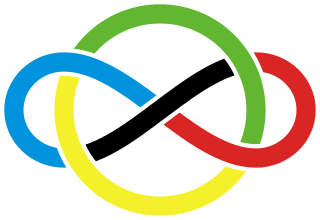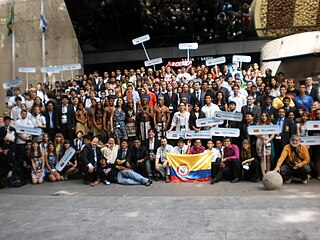
The International Olympiad in Informatics (IOI) is an annual competitive programming competition and one of the International Science Olympiads for secondary school students. The first IOI was held in 1989 in Pravetz, Bulgaria. It is the second largest science olympiad, after the International Mathematical Olympiad, in terms of number of participating countries. Each country sends a team of up to four students, plus one team leader, one deputy leader, and guests.

Peter Williston Shor is an American professor of applied mathematics at MIT. He is known for his work on quantum computation, in particular for devising Shor's algorithm, a quantum algorithm for factoring exponentially faster than the best currently-known algorithm running on a classical computer.

The International Mathematical Olympiad (IMO) is a mathematical olympiad for pre-university students, and is the oldest of the International Science Olympiads. It is “the most prestigious” mathematical competition in the world. The first IMO was held in Romania in 1959. It has since been held annually, except in 1980. More than 100 countries participate. Each country sends a team of up to six students, plus one team leader, one deputy leader, and observers.
The International Physics Olympiad (IPhO) is an annual physics competition for high school students. It is one of the International Science Olympiads. The first IPhO was held in Warsaw, Poland in 1967.
The International Chemistry Olympiad (IChO) is an annual academic competition for high school students. It is one of the International Science Olympiads. The first IChO was held in Prague, Czechoslovakia, in 1968. The event has been held every year since then, with the exception of 1971. The delegations that attended the first events were mostly countries of the former Eastern bloc and it was not until 1980, the 12th annual International Chemistry Olympiad, that the event was held outside of the bloc in Austria. Up to 4 students for each national team compete around July in both a theoretical and an experimental sections, with about half of the participants being awarded medals.
Soviet Student Olympiad was an annual set of contests for students in the USSR. There were two separate multi-round competitions every year: for higher education (universities) and general education. Both competitions had several rounds, and winners from lower rounds would go to the next round. Not only individual members, but teams were awarded too. The main difference between two Olympiads was that the school one had separate threads for every grade, while the university one was for all students.
The United States of America Mathematical Olympiad (USAMO) is a highly selective high school mathematics competition held annually in the United States. Since its debut in 1972, it has served as the final round of the American Mathematics Competitions. In 2010, it split into the USAMO and the United States of America Junior Mathematical Olympiad (USAJMO).
The American Mathematics Competitions (AMCs) are the first of a series of competitions in secondary school mathematics that determine the United States of America's team for the International Mathematical Olympiad (IMO). The selection process takes place over the course of roughly five stages. At the last stage, the US selects six members to form the IMO team. The 1994 US IMO Team is the first of the only two teams ever to achieve a perfect score, and is colloquially known as the "dream team".
The United States of America Computing Olympiad (USACO) is an online computer programming competition, which serves as qualification for the International Olympiad in Informatics (IOI) in the United States of America. Primarily for secondary school students in the United States, the USACO offers four competitions during the academic year. Participants compete in four increasingly difficult divisions, each of which is provided a distinct set of 3 solvable competitive programming problems during each contest. Coding & submitting computer programs can be done in one of four languages: C, C++, Java, and Python. Competitors begin in the Bronze division, and advance through the levels by performing well in their current division.
The Mathematical Olympiad Program is an intensive summer program held at Carnegie Mellon University. The main purpose of MOP, held since 1974, is to select and train the six members of the U.S. team for the International Mathematical Olympiad (IMO).
The Bermuda Bowl is a biennial contract bridge world championship for national teams. It is contested every odd-numbered year under the auspices of the World Bridge Federation (WBF), alongside the Venice Cup (women), the d'Orsi Senior Bowl and the Wuhan Cup (mixed). Entries formally represent WBF zones as well as nations, so it is also known as the World Zonal Open Team Championship. It is the oldest event that confers the title of world champion in bridge, and was first contested in 1950. The Bermuda Bowl trophy is awarded to the winning team, and is named for the site of the inaugural tournament, the Atlantic archipelago of Bermuda.

The International Linguistics Olympiad (IOL) is one of the International Science Olympiads for secondary school students. Its abbreviation IOL is deliberately chosen not to correspond to the name of the organization in any particular language, and member organizations are free to choose for themselves how to designate the competition in their own language. This olympiad furthers the fields of mathematical, theoretical, and descriptive linguistics.
This article describes the selection process, by country, for entrance into the International Mathematical Olympiad.
The International Mathematical Contest in Modeling (MCM) is a multi-day mathematical modelling competition held annually in USA, during the first or second weekend in February, since 1985 by COMAP and sponsored by SIAM and INFORMS. It is distinguished from other major mathematical competitions such as the famous Putnam Competition by its strong focus on research, modeling skills, mathematics, originality, teamwork, communication and justification of results. It runs concurrently with the Interdisciplinary Contest in Modeling (ICM).

The International Olympiad on Astronomy and Astrophysics (IOAA) is an annual astronomy and astrophysics competition for high school students. It is one of the international science olympiads.
Dragomir R. Radev was an American computer scientist who was a professor at Yale University, working on natural language processing and information retrieval. He also served as a University of Michigan computer science professor and Columbia University computer science adjunct professor, as well as a Member of the Advisory Board of Lawyaw.
The United Kingdom Linguistics Olympiad (UKLO) is a linguistics competition for primary and secondary school students in the United Kingdom. The competition is divided into four levels: Breakthrough, Foundation, Intermediate and Advanced, collectively known as 'Round 1', with the top-scoring 5% of entrants at Advanced level eligible for a follow-on round, called 'Round 2' and selection for participation in the International Linguistics Olympiad, one of the international science olympiads. In 2009, teams from two schools competed in a pilot competition, with the winners taking part in the international contest as guests of the All-Ireland Linguistics Olympiad. In 2010, an independent olympiad was created and has taken place every year since.
The Australian Computational and Linguistics Olympiad is a linguistics and computational linguistics competition for high school students in Australia, and has been held annually since 2008. The competition aims to introduce students in Years 9-12 to language puzzles so they can develop problem-solving strategies and learn about the structures and diversity of the world's languages. The competition has grown each year, and now involves around 1500 students participating from schools around the country.
The Bulgarian National Olympiad in Linguistics is an olympiad for school students in Bulgaria, composed of three rounds: municipal, regional and national. The olympiad's present format has been used every year since 2003.




